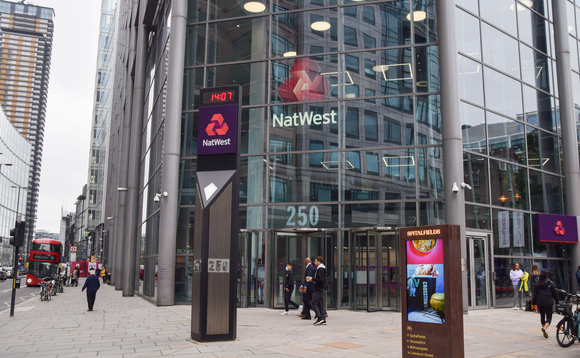NatWest Group yesterday (9 February) promised to stop providing loans for new oil and gas projects, while providing at least £10bn in lending to help improve the energy efficiency of UK homes, as the bank gears up to become one of the first in the UK to publish a Climate Transition Plan next week.
From this month, NatWest said it would stop providing reserve-based lending specifically for the purpose of financing oil and gas exploration, extraction, and production for new customers.
It added that from 31 December 2025 it would also stop renewing, refinancing, and extending existing reserve based lending specifically for such projects.
As of December 2021, NatWest's loans to oil and gas projects totalled under £1.7bn, which amounts to 0.7 per cent of the bank's entire lending portfolio, according to its most recent climate-related risk disclosure report.
Meanwhile, the bank said it would funnel significantly more financing into the green economy, particularly towards decarbonising UK homes, including through a fresh pledge to provide at least £10bn in lending by 2025 to help homes achieve A and B ratings for energy efficiency.
To support this pledge, the bank said it has created a 'One Stop Portal' to help customers "work out what they need to improve the energy efficiency of their home, find the finance and source a supplier".
In addition, NatWest yesterday unveiled plans for a pilot project to explore how to retrofit homes at scale in a way that is affordable for homeowners, as part of a new collaboration with British Gas owner Centrica, Schneider Electric, and Places for People.
Alison Rose, CEO at NatWest, said the bank's pledge to stop lending to oil and gas projects and ramp up green financing for decarbonising homes "sends a strong signal that we are serious about ending the most harmful activity whilst financing the transition".
"I want to send a very clear message at the beginning of 2023 that we are not letting up on tackling climate change," Rose said in a speech announcing the new commitments yesterday. "Not only is tackling climate change the right thing to do for the planet and for future generations but, as our adviser Lord Stern has always said, it is a massive growth opportunity for the bank and for many of our customers.
The moves come a week ahead of the launch of NatWest's first Climate Transition Plan - now a regulatory requirement for UK listed companies and large asset managers - which is expected to set out plans for further investment to help its business customers boost their climate efforts.
Rose said the forthcoming plan would also assign "significantly more money" for green mortgages - which incentivise homeowners to invest in energy efficiency - as well as more tools to rapidly increase the rate of retrofitting across the UK.
Previous research by NatWest has identified a potential £175bn opportunity for the UK economy through the transition net zero emissions, which Rose described as "an opportunity we cannot miss".
"I want to send a very clear message at the beginning of 2023 that we are not letting up on tackling climate change," said Rose. "Put simply, tackling the climate emergency is one of, if not the biggest issue of our time - and banks have a massive role to play in mobilising the power of finance to meet the net zero ambition."
Elsewhere in her speech, Rose stressed the current cost of living crisis facing people across the UK and recessionary fears facing British businesses underscored the need to go further and faster in pursuit of net zero.
"I understand the Cost of Living is what most people are focussed on, but I believe that Cost of Living concerns can lead to more and better action on tackling climate change," she said. "More energy efficient homes and buildings, bringing down energy costs, more revenue opportunities for SMEs, more upskilling across the whole of the UK to drive local economies, more brilliant collaboration between the public and private sectors."
The new commitments were welcomed by Tony Burdon, CEO at the Make My Money Matter campaign, but he also argued the pledge to stop financing new fossil fuel projects could be delivered with immediate effect.
"Today's announcement from NatWest represents further progress for campaigners calling for UK banks to stop financing fossil fuel expansion," he said. "However the bank's decision to wait three years before implementing its policy is at odds with the urgency of the climate crisis, unpopular with its customers and undermines NatWest's aspirations to be a climate leading bank.
"HSBC and Lloyds have already ruled out direct financing for new expansion. There is no reason why NatWest should wait three years to do the same. That's why we're calling on NatWest to stop delaying, and to immediately rule out direct financing of fossil fuel expansion for new and existing clients, before then putting clients on notice that they will not be eligible for any corporate finance if they continue to develop new oil and gas fields. Failure to take these steps risks jeopardising the otherwise positive and ambitious actions the bank is taking on climate change."
The announcement comes as a group of investors with more than $1.4tr of assets under management have written to leading European banks asking them stop financing new oil and gas fields.
Coordinated by ShareAction, the investor-backed letters, sent out earlier this week, calls on the banks to stop bankrolling oil and gas projects that threaten to push global temperatures to even more dangerous levels.
Letters were been sent to Barclays, HSBC, BNP Paribas, Credit Agricole, Detusche Bank, Société Générale by a coalition of investors, including Nest, LGPS Central, and the Brunel Pension Partnership.





